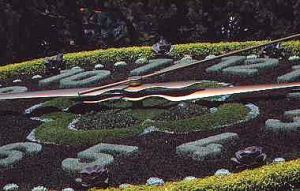It’s all in the detail !
Today, I thought some technical stuff was in order.
I’ll try and make it interesting, no doubt you will let me know ?
I spent almost as much time as a Quantity Surveyor as I did a Landscape Architect & Contracts Manager… the worst part was as you grow a business you have to give up various aspects of the work, allowing others to do it instead.
The secret is always find someone better than you to do the job you are relinquishing…
Then catch them doing it right and praise them, whilst simultaneously stopping them from doing it wrong, without to much rancour.
Some years ago, just after I graduated I found myself working in the minor engineering and technical department for a large London Boroughs Parks Department – today you would be called a Landscape Architect, but in those days the Parks Managers wanted folks with hands on experience. This meant we not only knew how to design, but we also knew how to build and even better we knew how to manage the project, including the labour, right down to the work study times it took to build a specific item. We looked after Schools, Parks, Playgrounds, Golf Courses, Verges, Allotments, Open Spaces, Housing Sites and the odd Airfield.
I always wondered why we frantically completed a valuation of work ( right down to the allowed minutes of time each element took) every Monday morning , then rushed the ‘bonus’ sheets over to the treasurers department on Tuesday morning so the staff could be paid their bonuses on time each Friday – hourly paid staff were paid weekly in England ( us salaried staff were paid monthly, we even worked flexi time with every other Monday off, those were the days as they say !).
In later years these standard minute values that had so painstakingly been obtained turned out to be especially useful when pricing large scale contracts, as they were actual times not priced rates.
What was more interesting though was they enabled someone to build up a time and thus rate for all manner of projects. So we could accurately figure out how long a BBQ would take to build for instance, or how long 5 tonnes of tarmac would take 3 men to prepare, lay, roll and clean up.
When semi automatic pricing came along in the form of access based databases it was easy to ‘plug’ these times into the program to use for pricing projects.
This worked great for projects where you weren’t tendering for a job, as you were usually able to produce a fair price, quickly and accurately.
The projects that went out to tender were much more of a lottery, as depending on who was pricing and why, often dictated how the pricing went… No one minds losing a tender by say 1-2% and if everyone has a similar price. It would suggest that the bill of quantities , drawings and specifications are usually going to be an accurate reflection of the work in hand, without any unforeseen errors.
What is intensely irritating from a contracting point of view is when you carefully price a project and then lose by more than 15%, I’ve often wondered why during the assessment phase a tendering body doesn’t add up all the tender values, then divide by the number of tenderers and use that mean figure as the basis for the work – we found that more often than not when we did this in the parks department that was the final cost of the project. I believe the Dutch usually take the second lowest price as this makes it almost impossible to ‘buy’ a job by underpricing !
One of the early ‘tricks’ we learned, was how to be asked to price the better projects if we eliminated the ‘snagging or punch list’. The client put us to the top of their use list. More often than not our site staff ‘snagged’ as they went along, this saved us so much time we gave them a bonus.
Another trick was to put the projects up for a national award – we were fortunate to receive 17 national awards over the years, they were great for staff moral , even better for our clients who then asked us to price some fabulous projects.
We have always tried to be professional, to do the best job we could for a client, avoiding confrontation as much as possible, sure we negotiate hard, but not too aggressively. – the saying ‘Under promise and over perform’ is a great way to work.
The pointing above is typical of our approach, when it comes to the finish it is essential to maintain a clean consistent finish, it looks good, keeps everyone happy..
The real pearls of wisdom are ” Quality is remembered long after the price has been paid ”
Have you visited one of your old projects recently?
What did it look like?
Listen to Ann & Chris at Growing Trends













